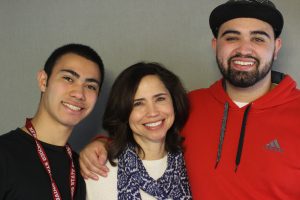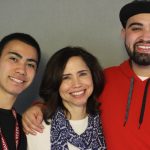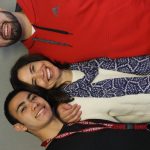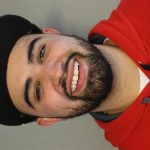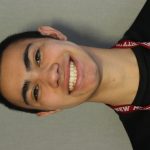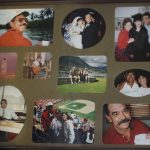Barbara DeLeon, Phillip DeLeon, and Matthew DeLeon
Description
Brothers, Matthew DeLeon (18) and Phillip DeLeon (20) interview their mother, Barbara DeLeon (49) about her father and what he was like.Subject Log / Time Code
Participants
- Barbara DeLeon
- Phillip DeLeon
- Matthew DeLeon
Recording Locations
Las Cruces Museum of ArtVenue / Recording Kit
Tier
Initiatives
Keywords
Subjects
People
Transcript
StoryCorps uses Google Cloud Speech-to-Text and Natural Language API to provide machine-generated transcripts. Transcripts have not been checked for accuracy and may contain errors. Learn more about our FAQs through our Help Center or do not hesitate to get in touch with us if you have any questions.
00:02 Hello. My name is Philip de Leon. I'm 20 years old. Today is January.
00:09 9th 2016 where in Las Cruces New Mexico? I'm here with my mom Barbara and my brother Matthew.
00:18 Hello, my name is Matthew DeLeon. 18 years old. Today's date is January 9th 2016 rear end, Las Cruces, New Mexico, and I'm here with my mom Barb Barbara and my brother Philip.
00:36 Hello, my name is Barbara DeLeon and I am 49 years old. Today's date is January 9th, 2016. Where in Las Cruces New Mexico and I'm here with my son Philip and my son Matthew.
00:54 All right, so you wanted to ask you some questions about your father or Grandpa Johnny Gallegos. Do you want to start?
01:02 Yes, tell me about Grandpa Johnny.
01:07 Grandpa Johnny was born in 1944 on a ranch outside of small town in South Texas called Charlotte, Texas and he was the oldest son of Petra and DG Gallegos and
01:28 He had two brothers and a sister and he grew up in Charlotte, Texas. It was a really small town right now. The population is about 1000 people and I don't think it was bigger than that when he was there.
01:43 His dad worked in the oil fields and
01:48 His mom stayed home took care of them and he was a really good student and he was a really good athlete while he was growing up. He played all sports baseball renttrack played football. He was in the marching band. I would like to think about the story. He would tell me in high school there school was so small that he was a quarterback of the football team, but he also played trombone in the marching band and at halftime for the for the football games, he would just you know, put down his football stuff and go get the trombone and then do the halftime show with the marching band and then go back to the to the football game, but he was a really good athlete in a good student.
02:42 And he met my mom in in school in Charlotte. They knew each other from the time they were little and they were high school sweethearts and they got married when they were 17 years old when they were just after their junior year in high school and my mom dropped out of school and my dad continued on and his senior year and finished finished high school.
03:09 And then
03:13 My mom said she told me the story before she worked in a drugstore while my dad was going to school and she said that some local businessman in the small town came around to ask them what he would my dad was going to do with Grandpa Johnny was going to do after high school and he said well, I don't know I guess, you know work in the oil fields and they said, you know, you're a really smart kid. You really should think about going to college and he said I really don't have I don't have money for a college and they got together and they got enough money to send him to college.
03:54 So it's just me so much because
04:00 They weren't related to him.
04:03 They just have a lot of potential in him.
04:07 It really changed his life changed his life because he went to college.
04:14 By the time Huey and my mom were 22, they had all of us and I have two sisters and it was really hard to finish.
04:23 College but he did.
04:26 I hate became a petroleum engineer.
04:29 I went to work for Texaco. He went to work for a consulting firm and they ended ended up spending most of his career at Occidental Petroleum, and I got to live all over the world. We got to live all over the world with him and I think about that that decision to go to college and how different things might have been.
04:56 But
04:58 It really changed the course of his life. I think.
05:04 My college did he go to
05:06 He went to Texas a&i University and it was called back then right now. It's it's I know it's part of the Texas A&M system, but it was Texas a&i University in Kingsville, Texas. And that's where I was born. Cuz I was born while he was in college. My mom was taking care of my older sister Kathy and me and they lived in little little married student housing and then I think a little a little house that they rented and
05:38 I would remember my mom said when I was born and my dad was up studying he would study really late and he was watching The Tonight Show with Johnny Carson and she came out and said, you know this babies come in and off they went and I was I was born interrupted his Tonight Show and studying. He always said
05:58 Honeywell, yep, that's where he went to school and then afterwards he worked in South Texas and in various towns and then they went to Ecuador when my younger sister was about to sin 1969, I believe and that was our first trip overseas to work and it was a very eye-opening experience for them. It was good because they my dad and my mom both spoke Spanish. And so, you know, there was in South America they spoke Spanish there, but it was a very different way of life and after that they came back to South, Texas and worked in Corpus Christi, Texas.
06:38 And then when my dad got the job with Occidental Petroleum, we moved to Tripoli Libya North Africa and that was another huge shock to us to our family but it made our family closer because it was it was so different. We had to learn to just rely on each other. There were no televisions there was one television station. It was a state television station. So everything was in Arabic, so it wasn't like we could watch it. There were no telephones in my older sister Cathy was just in shock cuz she was in Middle School at that time and she was always on the phone with her friends. So there were no phones we lived in a neighborhood. That was mostly people from other countries United States Canada a different European countries who were there to work and so we were a very tight-knit community of expatriates there and Libya
07:34 I'm one of the things I remember as we all pitched in to help each other. My mom used to tell me the wives would exchange recipes for the different ingredients. They could get their there were there were new to us that we weren't familiar with my dad pitched in and he helped coach the Little League teams, cuz there weren't enough people to do it and he didn't even have sons that played on the team, but that's the kind of guy. He was he wouldn't both my parents they would you know pitch in and help when when help was needed.
08:08 And
08:11 Then from Libya we we went back to the States for a while. And then we lived in Peru and Lima Peru.
08:20 And Grandpa Johnny had a job there where he would work two weeks in the jungle where the oil fields were and then he comes two weeks with us and Lima where we were living in so we try not to get into too much trouble while he was gone. So that when he came back you Nanny wouldn't be telling him all the things that we had done. We just tried to be good so that when he was back home, he would we could enjoy him the time that he was with us. So that was kind of hard when he would be gone and then come back but it was good. He he liked his work and he hears he's a very hardworking person.
09:02 What do you miss most about Grandpa Johnny?
09:07 I miss being able to ask him for advice. He was he had so much experience and so many things he was he was a down-to-earth person. So he he he had a lot of practical experience he knew how to fix almost anything. He would try his hand at fixing things and in cars electrical things, you know carpentry work. He did painting So if I had a question about house or or my car something he always he always would give me good advice if he wasn't there to pitch in and help fix it and when I was starting my career, I remember asking him about in a career advice about what it was like to be a manager what it was like, you know as you moved up in a company or
09:56 What did he say if he thought I should go for a particular job or not. And so I I like being able to talk to him about about work things about.
10:07 Just like I said about practical things he was he was just incredibly helpful person and he was also a very calm person. I had two sisters growing up. So there was a lot of drama in our house. Usually someone was upset. Somebody had borrowed somebody's clothes. Somebody had whatever are there was a lot of things going on and and he was the only guy in the house and he was usually the one who didn't react to just kept calm who just kind of smooth things over between us if if someone had done something to somebody else somebody had taken somebody else's something or the other he would just go get another one. He didn't want to hear us arguing or fighting. He didn't like that. He wanted us all to just to just get along. So I miss I miss that influence that he had on all of us because he he was he was the the person who would just going to make us see that he was always telling us that the material things.
11:07 Don't matter it's the relationship so somebody took yours pair of shoes or somebody in a bar that somebody crashed the car. That's all material things that can be replaced. Those are all material things. They can be replaced. But what's most important is the relationship between, you know each other that we support each other that we love each other that we help each other.
11:36 So going back maybe to the South Texas you made it through middle school and high school officer. Alright, but then was he a teen when he ended up going to college and he got through we got through college the regular amount of time or right after high school. And like I said, he was already married at a very young age. My mom and dad were 19 years old when they had my older sister today. I've been married a couple years, but they were still very young. So in my father's I think he would have been in his second year of college when my older sister Cathy was born. So they, you know, my mom was kind of keeping that under control the family and everything and he would concentrate on studies in the summer time. He'd go back to Charlotte from Kingsville, and I'm working in the oilfield with my grandfather.
12:36 Then go back to college, you know in the regular year Fallen Fallen spring, but there came a time. I don't know all the details. I think I think when he was maybe 21 or 22 he dropped out for a year and he went to work for a year, but then you know, he was encouraged to go back and finish them. So he graduated when he was 23 years old and so he took a little bit longer then you know the regular for years, but he was also you know, he's studying the Hartfield petroleum engineering it was there was a lot of math and science. It was difficult. I still have his slide rule. There were no calculators back then such a do all those very difficult math calculations. He had to use a slide rule. I always remember being very much in awe of his ability to Cal.
13:36 Play things in his in his head because of course I grew up with calculator to my time. I went to college. I had these fancy HP calculator and so it was really easy for me to be able to to do things but he grew up in an age for a lot of that. You just had to figure out in your mind or with the slide rule. And so I always thought he was so much smarter than I was because he he really had to think things through and I remember being really embarrassed when I graduated from my undergraduate degree, and and I had a business degree.
14:10 And he was at the time I think he was thinking about buying a house or I'd remember what it was. He was buying and he was wanting to do a loan amortization table where you at, you know how to figure out how much money you were going to take over the loan you had an interest rate you had a certain amount of years you were going to pay it back. It was going to be a no one some once a month payment whatever and he wanted to know what the amortization table was. Am I calculator was out of and that's the only way I knew how to calculate a loan payment was with the calculator but he sat there at the table and then he got out of piece of paper and started writing his out and he calculated with the loan payment was and I never felt more dumb that he did he put me to shame because he was he was so smart and he would just he was a kind of person that if he didn't know the answer to something he didn't give up he would sit there quietly.
15:08 And he would think about it and we didn't have the internet back there where you could ask Google something or anything like that. He would just think about things course you would talk to other people, but if he could figure it out himself he would
15:26 Can't talk about the biggest obstacles you overcame in life. He overcame life. Yeah, I think I mentioned some of them earlier Grandpa Johnny he grew up in a small town on. You know that the school was probably not the best school that he went to is all once there was just one school in Charlotte that was in your Elementary than Middle School and High School altogether his parents weren't Rich they weren't in a completely poor because they but they both came from big families where resources were spread thin they were used to working hard and that was probably the biggest thing that they passed on to Grandpa Johnny was to be a hard worker that you could have obstacles. But if you if you gave up will that was it, you know, but if you worked hard you could usually work through any problem that you that you came across he didn't have money to go to college. But as I said that, you know local businessman.
16:26 Felt like he really had a lot of potential and they helped him. They helped him get going. He you know, I had to pay back loans and things and those are all things that are hard to do. But again, he worked hard. I remember him being up early in the morning working late at night. Sometimes when we were overseas, he would be the one to take on the assignment to work over holidays or whatever. So he always felt like hard work with something that he wanted to show us was a value it would help, you know the community if he was helping a project at our school or if he was helping his company whatever company he worked for. He always put in the time and always gave his best effort.
17:22 He his parents were were not well off and when we would come back from being overseas, he was always we weren't always in contact with them cuz we didn't have the internet or email or stuff like that. We would get letters we come back when we find out what was going on who was sick or who needed a car or you know who needed to be bailed out of jail or whatever was going on and so he was always there to he really played that role for his family for his extended family. He would help with whether you know with money. He was always very generous. He didn't expect anything in return He gave very freely to his family because he felt like they had helped him out. His parents had helped him when he was in college. They would send him into they would come back for the weekend. He and my mom and Nanny and us as little kids and big Grandpa big round.
18:22 I would send them back with the car full of food, you know, they would help however, they could and so he really felt strongly he wanted to pay back. So if he bought a truck in a first time when we were living in the states, and then we were going to go overseas. He would give that truck to my grandfather cuz he knew he could he could use it at the ranch if he needed a piece of equipment or if he needed you wanted to buy some more cows for the ranch my grandfather then Grandpa Johnny would help to make that happen. So he he overcame those obstacles, but he all he never forgot that he wanted to help his community and help his family and he did and I think that's one of the big lessons. He taught me also would if you're going to give don't do it out of thinking that you're wanting to get paid back do it because it's the right thing to do. And and that's your that's your pain.
19:22 That you know that you're doing the right thing.
19:27 Told him like you you said you moved from Texas to South America and North Africa back to the United States. In fact something. What was that? Like on him having a moving entire family overseas so many different times actually a lot of that. Feltham Nanny tell my mom. She was very very good at handling that side of it. Luckily Grandpa Johnny's company would set up the movers and take care of all the logistics for getting it take first that sometimes he would go ahead and you know when we went to when he was going to Libya that was 1977.
20:12 He went ahead of us and we were left behind so that Nanny could get everything packed up get the house ready to sell and that we were living in Corpus Christi. We were living in Corpus. So Grandpa Johnny went ahead to Libya and we had no contact with him. There was no phones if we wrote a letter it would take a month to get there because it we worse it was getting sent through careers in different ways. And so we really didn't have any real-time communication if he wanted to call us if there was an emergency there was a certain way you could do that, but we really weren't in contact with him and that time was really difficult because Nanny's father got very very sick and died and we really didn't have a way to get that information back to Grandpa Johnny.
21:05 And
21:09 We are preparing for the funeral and all of all of nannies, you know, 11 brothers and sisters were getting ready to come to the funeral and we had sent a message to Grandpa Johnny's company to see if they could just let him know we didn't assume he'd be able to come back cuz it was so far away will the same time somehow Grandpa Johnny felt like something was wrong and so he actually started coming home.
21:43 You just felt like something was and I don't know. I haven't had that happen. But anyway, he just said I need to go home. I need to see how things are going. And so he started making that trip home and it was you know Livia to I don't know what his route was. A lot of times we go from Tripoli to Amsterdam to Houston then to San Antonio, then you have to get a car and drive to wherever we were in any way. He missed the funeral, but he ended up we wouldn't even know he was coming home and he showed up in the middle of the night at my grandmother's house. I think I think it was like the day after the funeral something like that very close to to win.
22:26 The one we had had the funeral and what had happened. Was that very last leg of the trip. He got into San Antonio rented a car and on his way to my grandmother's house. He hit a deer in the middle of the night. So it was such a horrible trip and you know, such horrible circumstances, but we were we were so happy to see him. So anyway, that was very very good that he ended up showing up cuz like I said Communications were difficult and then we all went back to Libya together then at that point and
23:04 And then from Libya, like I said, we moved back to the States. We went to Lima Peru. I graduate from high school from there my my sister and I went to college in Austin at University of Texas and Grandpa Johnny and Nanny went on from there to live in Colombia and Bogota Colombia and then they went to Islamabad Pakistan.
23:29 And then they went from there to Bakersfield California for a while and then they went from there to Quito Ecuador. And that was Grandpa Johnny's last overseas trip because our assignment because that's where he got very sick and then came home and and died but it was very erotic because his first overseas assignment was in Quito Ecuador in 1969 or so, and then his last assignment was in Quito and he died in 1995, but he loved he loved traveling. He loved his work experience.
24:12 And like I said, we were we were very lucky that was a gift that he gave us that we got to experience that as well and see the world and see how other people lived and try to learn other languages and did he end up speaking another language? They spoke Spanish and English obviously, but he's not picking anything up or now. I mean in Libya.
24:39 But I don't think he really learned any other languages. Those were his two languages. He visited other countries to for his company like he went to Russia in the early 90s when they were thinking about opening up some oil fields are for his company and he went there and he said that he would never work there because he was going to business meetings with people in the middle of the day and he said they were completely drunk because they drank vodka at least the people he was dealing with from the morning till the evening and he just couldn't believe how they could function at all with all the alcohol. Yeah. So that was not a place that heat but he went he visited a lot of places in the course of his of working and of course in the course of travels hand and Nanny got to go to see the pyramids and and Egypt they got to see the Taj majal they went to Singapore for trips.
25:38 We were very fortunate. They got to really see the world in all because of know of his education and his job.
25:48 Are you comfortable or can't talk about jumping Johnnie's death? How did he die? Well, he he got very sick, but I think he'd been sit for a while. Grandpa Johnny was a very quiet person and he was a very private person so he didn't really like to talk about being sick or you know, if he was feeling bad he would just going to keep it to himself but I think he had been sick for a while. They had here Nanny had been living in Ecuador, but they were very excited his last year because that's when Philip was born Philip is the only grandson grandchild that he knew and believe me. He was very excited to have a grandson cuz I think he was looking forward to coaching Little League again for his own grandson and watching his grandson do Sports give Grandpa Johnny loves sports. He loves he played baseball even into his adult years and he just lost for words. But anyway, so he would they were very excited that last year.
26:48 Because Philip had been born they came to visit a couple of times. We were living in Colorado at the time your dad and I
26:58 And so that there was happy times but he was even probably more quiet than usual and then in June or so of 1995 after 6, excuse me after Philip was born. When he died in 1996. Sorry.
27:18 He came back to the States for some tests have been coughing and coughing and coughing and did it ended up that he had lung cancer and Grandpa Johnny was a lifelong smoker. He had smoke from the time. He was a teenager in South Texas. Both of my grandparents smoke everybody smokes and I had that time it was ridiculous. And then of course once they found out they were really addicted to smoking and everybody smoked all through the seventies and
27:50 We tried to get Grandpa Johnny to quit but he just he couldn't quit and so when he was stressed for works, like I said, he was quiet so he would sometimes I would wake up in the morning go down to his office and in the house and he would be there just kind of smoking and thinking and you could tell he was thinking about problems or something trying to solve problems and in his quiet way, maybe he'd be smoking and playing the guitar and just thinking you know, he would she just I think he smoked when he meditated. He smoked when he lives. Do you know and social situations? He just didn't know he was a smoker. So anyway, they found you know, a tumor and his and his lungs and so they did a biopsy so he was back in the States. He came back to San Antonio to get medical treatment I flew from Colorado to be with him in San
28:50 And I brought fill up with me as a baby.
28:53 And
28:56 They did a biopsy and they did they determined that the cancer was inoperable.
29:03 And so that was on a I want to say that was like a Thursday and it was like we were in shock we were all in shock and and they said he had probably less than a year to live and he was 52 years old at that time. And so we
29:20 We're trying to think about. Okay. Well, what are we going to do? We're going to have to move them back from South America and you know, they're they're going to stay there and get treatment. Where were they going to live because of Christmas they've been living in Ecuador didn't have a house there in San Antonio and cat was living in the house that they had bought and they wanted to have maybe something closer to where the medical center was where they would be getting treatment. So we're sort of all talking about this your dad flew in from Colorado so he could could have helped us out and
29:52 Sunday
29:55 Grandpa Johnny
29:58 Started feeling really bad and your dad and I had already gone back to where we were staying for the night. I think it was at at Uncle Mark and at Marcia's house.
30:07 And nanny called and she said something's really wrong with your dad and I'm calling the ambulance and so she called the ambulance and they came and picked him up and I didn't get to talk to him, but I could see him through the window of the ambulance. They were asking questions in that oxygen on his and I had an oxygen mask on and he was nodding or shaking his head as they were asking him questions and they came the paramedics came out and said we can't stabilize him. We need to take him to the nearest hospital. So we followed the ambulance and
30:37 When we got to the hospital that ambulance they were unloading him from the ambulance and I could see him we like them willing him to the hospital and he waved at
30:53 That was the last time I saw him alive.
30:59 Heart attack
31:02 It was very shocking.
31:09 We were just grappling with a Cancer and then
31:14 Heart attack and died. So suddenly it was very sad for us because
31:20 There are so many things that I would have liked to told him. We loved him, but I would have liked to have told him that.
31:33 It was just very shocking. It was a shock for us, but it was a blessing for him is what I have come to think about because
31:40 He would have suffered he would have suffered that last year with a cancer with a treatments and he was such a proud man, and he didn't want us to pass over him even though
31:52 You know there were
31:54 The three daughters and his wife we would have been probably, you know all trying to make him take his medicine or make him feel as possible and he didn't like being told what to do. That's for sure and you just didn't like being fussed over so
32:11 So I'm you know 20, it's been.
32:15 It's been you know so long it's been almost 20 years this coming July is going to be the 20th anniversary of his death and I cried for years after he died, but then I really did come to see that. It was a blessing for him for him. It was better that he died that way.
32:38 And
32:41 But it was hard on us who were left behind we were left in Oak in shock and picking up the pieces and moving Nanny back from South America. I took Phillip to Quito about a month after Grandpa Johnny died and went down there and you know got everything settled with his office and with the with their home there and moved everything back and and you know, we were left behind but we were left with so many good memories of him and so many blessing so many lessons that he taught us I thought about
33:16 I had a very good friend at the time Lisa Garcia. She had lost her dad when she was a sophomore in college at UT extras you the junior. I was a sophomore.
33:27 And she was 19 years old and I didn't I thought about it later when Grandpa Johnny died cuz I thought I was I was 30 at the time. So I had Grandpa Johnny so much longer than Lisa had been able to have her father. She was also very close to him. And so I I just, you know concentrate and how lucky I was to have had him for those years to learn in a good lessons for from him. But of course, it makes me very sad that he never got to know you guys cuz I know he would have really loved to have been around and that's why I what Nanny always says, that's why Nanny says she wants to be close to you all and and help you all because she knows Grandpa Johnny would have loved to have known both of you.
34:27 Or that you would like to pass down. Yeah. Definitely. I think I would like for you all to realize that your families are so important in a relationship with each other we argue sometimes or don't agree with each other. But this is the most valuable relationship that you will have in your life. You'll go on to you no have maybe wives and children of your own of course, but don't ever forget your your parents your your brother's if they're in need of help your grandparents always visit them in a we were we live far away and it was hard to be in communication with art with my grandparents. But you know, Grandpa Johnny was always doing every
35:21 He could to let them know that he was there for him. And so your communities are very important to be active in your community and your church help out. However, you can there are always people in need out there and they might need money or they might need your time just to sit and talk with people or they might need your talent. If you can help with your grandpa Johnny help with carpentry. He helped like as I was painting with electronics was fixing things whatever it was if he could do there's always a need out there and so we're not put here on Earth so we can just you know, look at ourselves and go what do I want? I want I want to buy this car. I want to go to this concert. I want to do this thing. We're put on Earth here to help each other. And so that's probably the most important value that I want you all to remember from Grandpa Johnny.
36:16 And is there something that you would want Grandpa Johnny didn't know about you.
36:22 I think that I'm pretty hard worker and I've gotten pretty far next semester. I'm going to pharmacy school so
36:30 Made it all the way through undergrad so.
36:34 Biking that I'm a hard worker too. And I've made it to my first semester of college tuition to bees and every single time. I just don't want to do something. I feel like I can't do it. I think Grandpa Johnny and how hard he worked and how he just made it through the worst situations. They've told me about I need are there any times in your life for you think of him think of things stories that I told you about him or things that he's done probably a while, but what if they can't I think of him I see his oxy helmets that you have in the living room and the watch that you have that was his that you wear the pants that how about when we have car accidents.
37:28 Had to buy told you the story one money my sisters and I were terrible drivers and we had car accidents and Grandpa Johnny was always very calm and just said he just wrote the check for the repair or the new car or whatever it was and he said, you know don't be upset don't be mad be glad that you weren't hurt. And that's just a material thing better is one day. I was going to be always said that Grandpa Johnny said
37:57 Material things can be replaced but your family cat.
